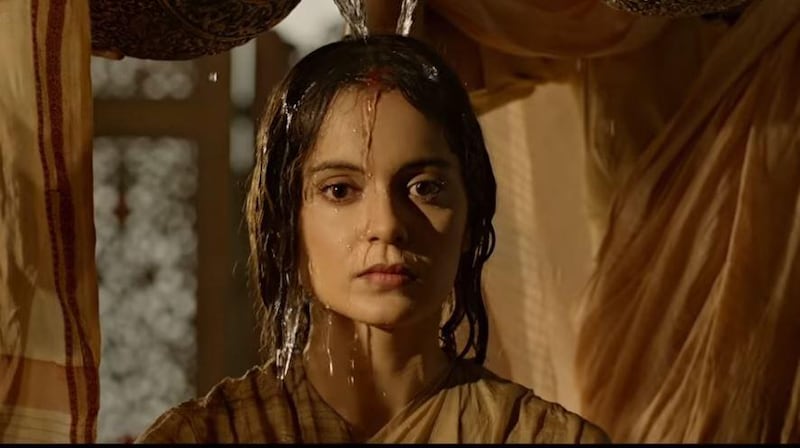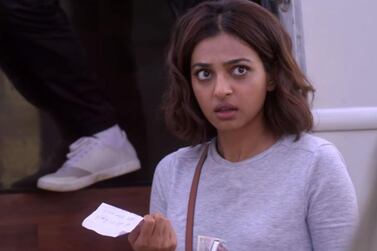This week Manikarnika and Thackeray hits movie theatres. Last week it was The Accidental Prime Minister, and before that Uri. Viewed in isolation, these are all films with India at their heart, but their scripts present a binding, bigger issue. The politicisation of cinema in India.
Manikarnika explores the story of Rani Lakshmibai, the former ruler of Jhansi. She ruled the region in central India in the 1850s, when it was being engulfed by the growing British East India Company. Her resistance and role in the Indian Rebellion of 1857 is not just a proud tale of a woman's valour – especially on the battlefield – but also a symbol of nationalistic pride.
The Manikarnika trailer:
Meanwhile, Thackeray is a biopic of Bal Thackeray, a politician who founded the Shiv Sena, a right-wing party dedicated to the cause of the Marathi-speaking natives of western India. A cartoonist by profession, Thackeray was born in 1926 and came into his own in the second half of his life as a firebrand leader and orator, never known to be on the politically correct side of an argument.
Many of his decisions exposed hypocritical standards. Though he coined a derogatory term in Marathi for Muslims, he maintained that all religions were welcome as long as the Hindu majority was respected. He also wanted priority to be given to those indigenous to his state of Maharashtra.
His soldiers in Shiv Sena were partners in the ruling government with the Bharatiya Janata Party (BJP). The BJP is the political arm of Rashtriya Swayamsevak Sangh (RSS), an organisation that has played a cat-and-mouse game with the Congress party, ever since Mahatma Gandhi was assassinated in 1948. Indeed, many believe the killing was the handiwork of RSS sympathisers.
Incidentally, another movie – a Hollywood production with operations based in Dubai - is claiming to unravel a few unknown truths about Gandhi's murder when it comes out next week on January 30, the anniversary of the leader's death. The Gandhi Murder was conceptualised three years ago, and while it remains to be seen what new information will come out of it after so many decades, the past month has seen a glut of films featuring Indian politics.
Bollywood filmmakers today are not averse to turning the pages of history to find their stories, some so recent that they don't need telling in the first place.
It does not matter that Nawazuddin Siddiqui was chosen for the role of Thackeray barely a year after being hauled over the coals by Shiv Sena for, as a Muslim from Uttar Pradesh, attempting to play a part in a mythological adaptation of the story of Hindu god Ram. It's interesting that a man from Uttar Pradesh got the protagonist's job when Thackeray himself kept asking why jobs were being given to immigrants.
In The Accidental Prime Minister, Anupam Kher portrays former prime minister Manmohan Singh as a weak personality under the influence of the Gandhi clan. The actor, Kher, has openly expressed his leanings towards BJP where his wife Kirron is a member of parliament. He was also the chairman of the film censor board. Uri, meanwhile, recounts a surgical strike launched to avenge Pakistan's terror attack in Kashmir in 2016.
More political films to come
There are at least two biopics in the works based on current prime minister Narendra Modi. Vivek Oberoi stars in one – Modi – which is being made in 23 languages for pan-India acceptance. Paresh Rawal, another actor and BJP MP, has announced another project focused on Modi.
Down south, the first installment of a two-part Telugu biopic on film-star-turned-chief-minister NT Rama Rao has been released, with the second segment out next month. Another political party, YSR Congress, has prepared a biopic on party founder, the late YS Rajasekhara Reddy, with Malayalam superstar Mammootty in the lead.
And then BJP supporter and film director, Vivek Agnihotri, is behind the upcoming Tashkent Files, based on the death of former prime minister Lal Bahadur Shastri. The former leader passed away overseas from a heart attack, but his death is still surrounded with an element of doubt.
Why so many political films now?
What is clear, though, is that the floodgates opening on such kinds of films is no coincidence. India goes to the polls in May. Both Congress and BJP are working overtime on social media to rake up as much drama as possible. Shiv Sena, with 19 seats in the last Lok Sabha elections in 2014 compared to BJP's 22, need a boost, especially as they are threatening to go alone this time, according to reports.
In the previous elections, Modi realised the potential of hologram technology, using his image and recorded monologue speeches to reach voters far and wide.
A cursory glance at the Instagram accounts of celebrities such as Ranveer Singh, Karan Johar, Anil Kapoor et al over the past few days will show selfies with Modi in New Delhi. The premier attended the weddings of Virat Kohli and Anushka Sharma, and Priyanka Chopra and Nick Jonas.
The Indian public is beseeched by cricket and Bollywood. This time, the hologram images alone will not do. Quite clearly, political storytelling is evolving through more mediums, and finding new arteries in the country's system.
_________________
Read more:
Mabrook: Nadine Labaki has made Oscars history already
Oscars 2019 set to go host free? Here's who we'd like to see in the job
Critics' Choice Awards 2019: Roma wins big, as Glenn Close and Lady Gaga tie
Golden Globes winners 2019: Lady Gaga, Rami Malek, Roma and Sandra Oh
_________________







